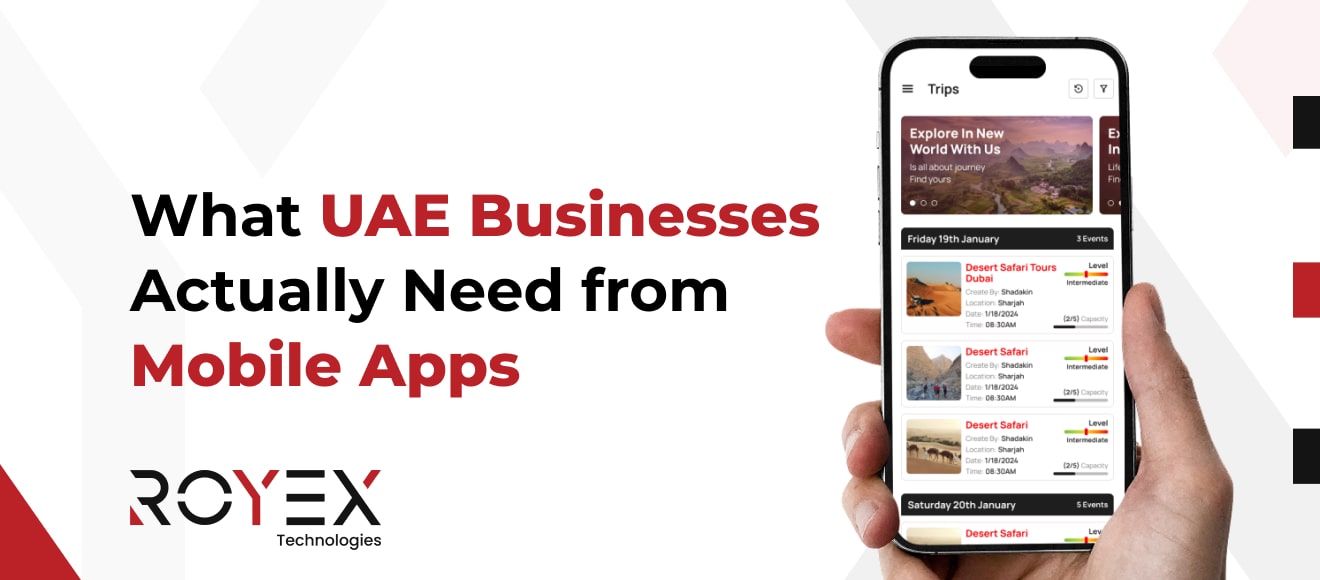
What UAE Businesses Actually Need from Mobile Apps
Introduction
Mobile apps have become more than just a trend in the UAE—they are now a business necessity. With one of the highest smartphone penetration rates in the world (96%+) and a government that actively promotes digital transformation (through initiatives like UAE PASS and Smart Dubai), businesses across the Emirates are expected to provide seamless mobile-first experiences.
But what do UAE businesses actually need from their mobile apps? Here’s a detailed look at the must-have features and functionalities that define success in the UAE market.
1. Bilingual & Culturally Relevant Interfaces
-
UAE businesses must cater to a multicultural population.
-
English and Arabic bilingual support is essential.
-
Apps should also be culturally sensitive (e.g., Ramadan campaigns, halal services).
2. Integration with UAE PASS & Emirates ID
-
For government services, fintech, healthcare, and real estate apps, integration with UAE PASS is a growing expectation.
-
Emirates ID validation allows faster onboarding and adds trust & compliance.
3. Secure & Diverse Payment Options
-
The UAE is moving towards a cashless economy, but users expect flexibility.
-
Businesses need to integrate:
-
Credit/Debit cards
-
Apple Pay, Samsung Pay, Google Pay
-
Local gateways (Network International, PayTabs, PayFort)
-
E-wallets for instant payments
4. Smart Notifications & Reminders
-
Customers expect proactive communication.
-
Mobile apps should send bill reminders, order updates, promotions, and personalized offers.
-
Notifications should be multilingual and customizable to avoid spam.
5. Data Security & Compliance
-
With strict UAE data privacy regulations and GDPR influence, apps must provide:
-
Two-factor authentication (2FA)
-
Biometric login (Face ID, fingerprint)
-
End-to-end encryption
-
Security builds trust and loyalty, especially in fintech, healthcare, and e-commerce apps.
6. Scalability & Performance
-
Dubai businesses grow fast, and so must their apps.
-
Mobile apps need to be built with scalable architecture to handle thousands of users without crashing.
-
Cloud hosting and modular frameworks ensure long-term reliability.
7. Integration with Business Operations
-
A mobile app shouldn’t just be a front-end tool.
-
It must integrate with:
-
CRM systems (HubSpot, Salesforce, Zoho)
-
ERP platforms
-
Inventory & logistics systems
-
This creates a real-time flow of data across the business.
8. Personalization & AI Features
-
UAE consumers expect apps to know their preferences.
-
Businesses should leverage:
-
AI-driven recommendations (shopping, dining, real estate)
-
Smart chatbots for 24/7 support
-
Predictive analytics for upselling and cross-selling
9. Offline Access & Usability
-
Many users expect apps to offer limited offline functionality (e.g., viewing tickets, receipts, or saved data).
-
This improves reliability and user satisfaction.
10. Analytics & Reporting Dashboards
-
UAE businesses want data-driven insights from their apps.
-
Built-in analytics should track:
-
User engagement
-
Conversion funnels
-
Customer retention metrics
-
Reports help companies optimize strategies and maximize ROI.
Why These Features Matter in the UAE
-
The UAE is pushing towards becoming a global digital economy.
-
Consumers expect apps that are fast, secure, multilingual, and integrated with smart services.
-
Businesses that don’t meet these expectations risk losing to competitors who do.
Conclusion
For UAE businesses, a successful mobile app is not just about design—it’s about integration, compliance, security, and user-centric features. Companies need apps that scale with their growth, meet regulatory standards, and enhance customer experience.
To make this happen, businesses must partner with experienced developers who understand both technology and the UAE market.
👉 Royex Technologies is a leading Mobile Apps Development company Dubai, with over a decade of experience building custom apps for startups, enterprises, and government entities. From bilingual interfaces to AI-driven personalization and UAE PASS integration, Royex ensures your mobile app meets the unique needs of the UAE market.





